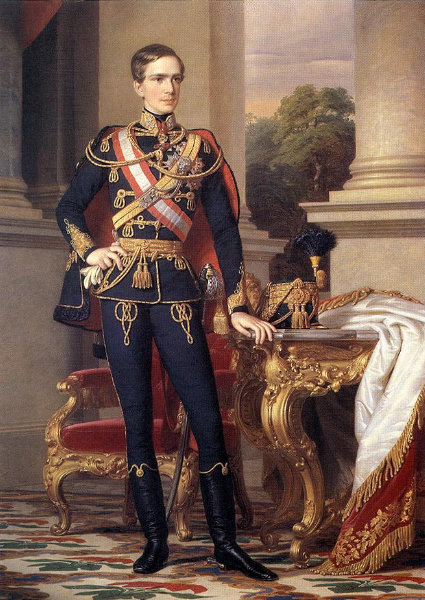London, GB | Formerly of New York, Buenos Aires, Fife, and the Western Cape. | Saoránach d’Éirinn.

About Andrew Cusack
 Writer, web designer, etc.; born in New York; educated in Argentina, Scotland, and South Africa; now based in London.
Writer, web designer, etc.; born in New York; educated in Argentina, Scotland, and South Africa; now based in London. read more
News
Blogs
Reviews & Periodicals
Arts & Design
World
France
Mitteleuropa
Knickerbockers
Argentina
The Levant
Africa
Cape of Good Hope
Netherlands
Scandinavia
Québec
India
Muscovy
Germany
Academica
The Young Emperor

A reader notes in correspondence that Franz Joseph was not always old — though the popular conception certainly is of the Emperor in his later years. Here is the young Franz Joseph (or Ferenc József), just five years after he became Emperor of Austria, King of Hungary, Bohemia, &c. The Emperor became so at such a young age because his father, Ferdinand I, abdicated after the revolts of 1848.
This portrait is by the Hungarian painter Miklós Barabás, who also completed portraits of the composer Franz Liszt, the novelist Baron József Eötvös de Vásárosnamény, William Tierney Clark, the Bristol engineer responsible for Budapest’s famous Chain Bridge, and many, many others.
Published at 8:02 pm on Friday 26 June 2009. Categories: Art Austria Bohemia Hapsburg Hungary Monarchy Tags: Austria, Hapsburg, Hungary, Monarchy.
Search
Instagram: @andcusack
Click here for my Instagram photos.Most Recent Posts
- Burns Tower April 19, 2024
- Patrick in Parliament March 18, 2024
- Articles of Note: 13 March 2024 March 13, 2024
- Cambridge March 9, 2024
- Taken on Trust March 4, 2024
Most Recent Comments
Book Wishlist
Monthly Archives
Categories
Home | About | Contact | Paginated Index | Twitter | Facebook | RSS/Atom Feed
andrewcusack.com | © Andrew Cusack 2004-present (Unless otherwise stated)



Correction, Emperor Franz Joseph was not the son of Ferdinand, who had no children. Rather, he was the son of Archduke Franz Karl.
That is right. Emperor Ferdinand, though married (to Maria Anna of Sardinia), never had any children. It is unlikely that the mentally unstable monarch even consumated his marriage. Franz Josef was rather the son of Archduke Franz Karl, Ferdinand’s brother and second son of Emperor Francis II.
There are a number of interesting stories about Ferdinand. One day while hunting he is supposed to have shot (what he believed to be) an eagle and asked why it had only one head.
Thank you, Mr Bennett; yours is the best story about the endearing Ferdinand I have yet heard.
But why say he was mentally unstable? He had severe epilepsy (the number of daily seizures occasionally reached twenty and more), and was no genius.
I prefer to see him as a lifelong twelve year old, who never lost his wonderment at the surprises of daily existence.
I have often thought that the magic of Prague would have been at its height during the twenty-seven years of his royal exile there from 1848.
The novelist Baron József Eötvös’s Village Notary (http://bit.ly/i8fXqM ) is one of the most famous works of Eötvös. It was known by the foreign criticism.